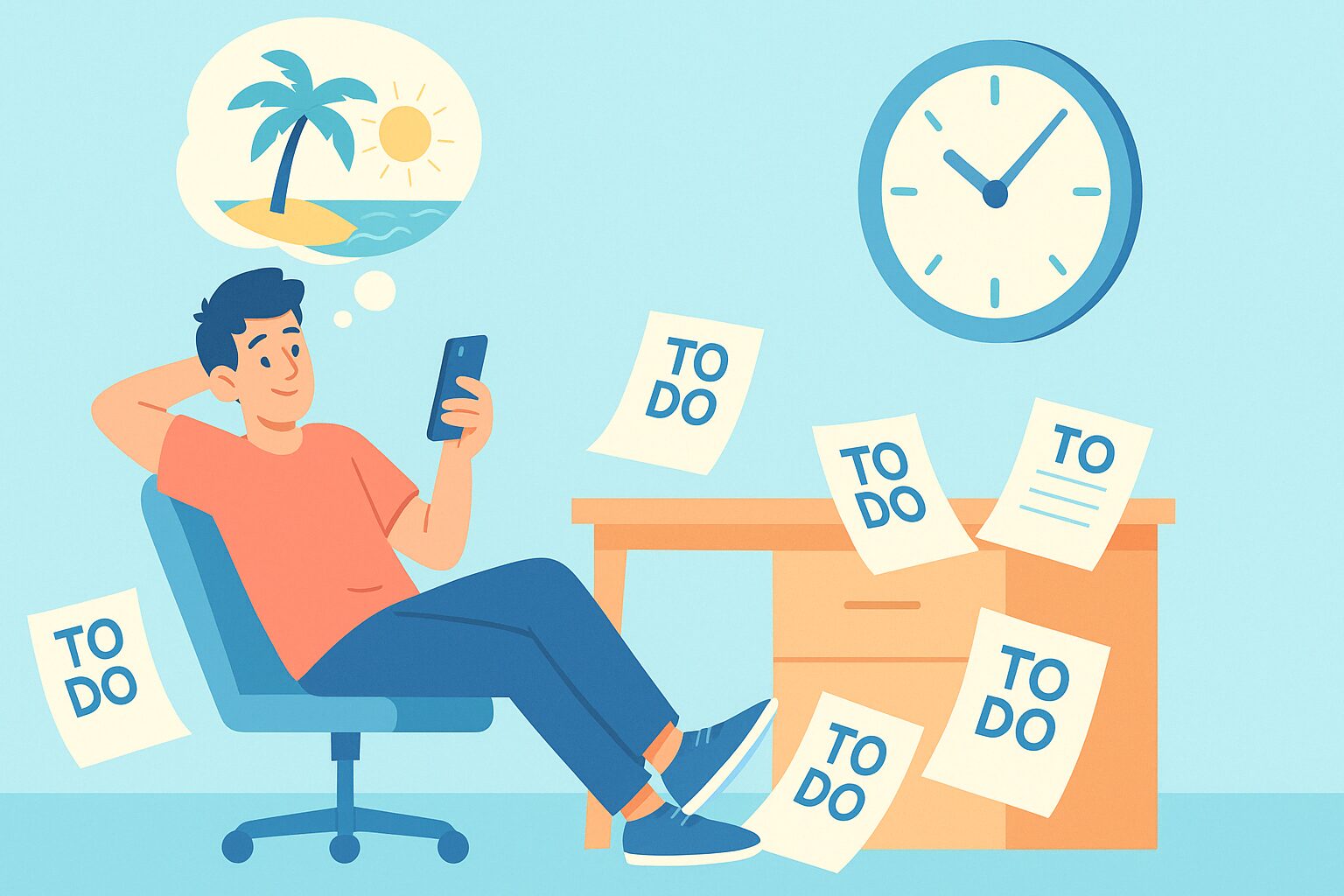Procrastination is something we all face at some point. Whether it’s putting off a big project or just delaying simple tasks, it can feel overwhelming. But it doesn’t have to be that way. By understanding why we procrastinate and applying some straightforward strategies, we can kick this habit and start making progress. Let’s explore some practical tips to help you stop procrastinating and get moving!
Key Takeaways
- Recognize your procrastination triggers and patterns to address them effectively.
- Break tasks into smaller, manageable steps to reduce overwhelm.
- Set clear goals with deadlines to give yourself direction and motivation.
- Use time management techniques like the Pomodoro Technique to stay focused.
- Create a supportive environment that minimizes distractions and encourages productivity.
Understanding Procrastination: Why We Delay Action
Okay, so procrastination. We all do it, right? But why? I’ve been thinking about this a lot lately, and it’s more than just being lazy. It’s like there’s a whole bunch of stuff going on in my brain that makes me put things off, even when I know I shouldn’t.
Procrastination is basically choosing to feel good now instead of dealing with something important that will benefit me later. It’s like my brain is wired to pick the easy option, even if it’s not the best one. I’ll scroll through social media for hours instead of working on that project that’s due next week. And then, of course, I feel guilty about it later. It’s a vicious cycle!
The Psychology Behind Laziness and Procrastination
Okay, so we all procrastinate, right? I know I do. But what’s really going on in our heads when we decide that cleaning the fridge is more important than finishing that report? It’s not just about being lazy; there’s actually some interesting psychology at play.
Understanding the Urge to Delay
For me, it often boils down to a few key things. First, there’s the fear factor. I think a lot of us avoid tasks because we’re secretly worried we’ll mess them up. It’s like, if I don’t try, I can’t fail, right? Then there’s the whole motivation thing. If a task feels boring or pointless, my brain just refuses to cooperate. I’d rather do almost anything else. And finally, sometimes I just feel completely overwhelmed. When I look at a huge project, I don’t even know where to start, so I end up doing nothing at all.
The Dopamine Connection
I recently read something about dopamine and how it affects procrastination, and it was pretty eye-opening. Apparently, our brains are wired to seek instant gratification. Things like checking social media or watching funny videos give us a quick hit of dopamine, making us feel good right now. Tasks with delayed rewards, like studying or working on a long-term project, don’t give us that same immediate boost. So, naturally, we tend to choose the short-term pleasure over the long-term gain. It’s like my brain is constantly saying, “Why work when you can watch cat videos?”
Stress and Avoidance
Stress and anxiety also play a big role in my procrastination habits. When I’m stressed about a task, my brain sees it as a threat. Avoiding the task temporarily reduces that stress, which reinforces the procrastination habit. But here’s the kicker: avoiding the task only makes me more stressed in the long run. It’s a vicious cycle! I’ve noticed that when I’m feeling particularly anxious or down, I’m much more likely to procrastinate. It’s like I’m trying to escape the bad feelings, but it always backfires.
Identifying Your Procrastination Triggers
Okay, so, I’ve been thinking a lot about why I procrastinate. It’s not just about being lazy, right? There’s usually something deeper going on. For me, it’s like a little alarm bell goes off in my head, and suddenly, anything sounds better than what I’m supposed to be doing. I’ve started trying to figure out what sets off that alarm. It’s like being a detective in my own brain, which is honestly kind of weird, but also helpful.
Common Triggers: Stress, Fear, and Overwhelm
Stress is a big one. When I’m stressed, I just want to shut down and do something easy, like binge-watch TV. It’s like my brain is saying, “Nope, too much!” Fear of failure is another trigger. I get so worried about messing something up that I don’t even start. And overwhelm? Forget about it. If a task seems too big, I’ll avoid it like the plague. It’s like I need to break everything down into tiny, manageable steps, or I’m doomed.
Personal Triggers: Recognizing Your Patterns
This is where it gets interesting. Everyone’s different, so what makes me procrastinate might not be the same for you. I’ve noticed a few patterns in my own behavior. For example, I tend to procrastinate more on tasks that I find boring or meaningless. If I don’t see the point, I just can’t get motivated. Also, my environment plays a huge role. If my workspace is cluttered and distracting, I’m way more likely to procrastinate. I need a clean, quiet space to focus. I’ve also noticed that I procrastinate when I’m tired or hungry. So, basically, if I’m not taking care of myself, I’m setting myself up for procrastination. Here’s a quick list of my personal triggers:
- Boredom with the task
- Cluttered workspace
- Lack of sleep
- Hunger
Setting Clear Goals to Combat Procrastination
I’ve found that one of the most effective ways to kick procrastination to the curb is to set crystal-clear goals. It sounds simple, but it’s a game-changer. When I know exactly what I’m aiming for, it’s way easier to get started and stay motivated.
Common Triggers: Stress, Fear, and Overwhelm
Stress, fear, and overwhelm are like the unholy trinity of procrastination triggers. When I’m stressed, my brain just wants to shut down and avoid whatever’s causing the anxiety. Fear of failure can be paralyzing; I start thinking about all the ways I might mess up, and then I don’t even try. Overwhelm is similar; when a task seems too big or complicated, I tend to put it off indefinitely. It’s like staring at a mountain and not knowing where to start climbing. I’ve learned that breaking down big tasks into smaller, more manageable steps can really help. For example, instead of thinking, “I need to write a whole report,” I tell myself, “I’ll just write the introduction today.” That feels much less daunting.
Personal Triggers: Recognizing Your Patterns
While stress, fear, and overwhelm are common triggers, I’ve realized that everyone has their own unique set of procrastination pitfalls. For me, it’s perfectionism. I get so caught up in trying to make something perfect that I never actually finish it. I also tend to procrastinate on tasks that I find boring or unpleasant. To combat this, I’ve started paying closer attention to my own patterns. I keep a journal where I jot down when I procrastinate, what I was feeling at the time, and what I was avoiding. This helps me identify my personal triggers and develop strategies to deal with them. For instance, if I know I’m going to procrastinate on a boring task, I’ll try to make it more interesting by listening to a podcast or working in a different location. I also use the 2-Minute Rule to get started, which states, “When you start a new habit, it should take less than two minutes to do.”
I’ve found that setting specific and realistic goals gives me a clear direction. When I know exactly what needs to be done, I can focus my energy on completing it. For instance, instead of saying, “I’ll study later,” I set a goal like, “I’ll review two chapters by 3 PM.” This clarity helps me prioritize tasks and avoid unnecessary delays.
Here’s a simple table I use to track my progress:
| Task | Goal | Deadline | Status |
|---|---|---|---|
| Write Report | Finish introduction | 4/17/2025 | In Progress |
| Clean Room | Clear desk and organize papers | 4/18/2025 | To Do |
| Exercise | 30 minutes of cardio | 4/19/2025 | To Do |
I also find it helpful to reward myself when I achieve my goals. It doesn’t have to be anything big; even a small treat or a few minutes of relaxation can be a powerful motivator. The key is to celebrate my progress and acknowledge my accomplishments, no matter how small. This helps me stay positive and build momentum, making it easier to keep moving forward. I also use accountability tools to stay on track.
Time Management Techniques to Stay on Track
Okay, so I’m the queen of procrastination sometimes. I get it. It’s tough to stay focused. But I’ve found some time management tricks that actually help me get stuff done. It’s not a miracle cure, but it’s a start, right?
The Pomodoro Technique: Work in Bursts
This one’s a classic, and for good reason. The Pomodoro Technique is all about working in focused bursts. I usually set a timer for 25 minutes and just concentrate on one task. Then, I take a short 5-minute break. It’s amazing how much I can get done in those 25-minute chunks. It helps me avoid burnout and keeps my energy levels up. I find that calendar, planner, or app helps me keep track of my time.
Prioritization: The Eisenhower Matrix Explained
Okay, this sounds fancy, but it’s really not. The Eisenhower Matrix is just a way to figure out what’s important and what’s not. It’s all about urgency and importance. I use it to categorize my tasks into four quadrants:
- Urgent and Important: Do these tasks immediately.
- Important but Not Urgent: Schedule these for later.
- Urgent but Not Important: Delegate these if possible.
- Neither Urgent nor Important: Eliminate these tasks.
By focusing on the high-priority tasks first, I avoid wasting time on less critical activities. It’s a game-changer for productivity. I’ve found that time-blocking is also a great way to manage my time.
Creating a Productive Environment
Okay, so, I’ve realized that my surroundings have a HUGE impact on whether I actually get anything done. If my space is a mess, my brain feels like a mess, and suddenly, scrolling through social media seems way more appealing than, say, writing this blog post. So, I’ve been trying to create an environment that actually helps me be productive, instead of sabotaging me.
Create a Dedicated Workspace
Having a specific area just for work has been a game-changer. Before, I’d try to work from the couch, my bed, the kitchen table… basically anywhere but a proper desk. Now, I have a designated spot, and when I sit there, my brain knows it’s time to focus. I try to keep it separate from my relaxation zones, so I don’t blur the lines between work and leisure. Weekends are ideal for recharging and preparing for the week ahead.
Remove Distractions Like Social Media
This one is tough, I won’t lie. Social media is my procrastination kryptonite. I’ve started turning off notifications on my phone and computer when I really need to concentrate. Sometimes, I even put my phone in another room. It’s amazing how much quieter my brain gets when I’m not constantly getting pinged with updates. I also use a website blocker sometimes, which helps me avoid the temptation to mindlessly scroll. Eliminating distractions in your environment not only improves focus but also makes it easier to take action on tasks.
Organize Your Tools and Resources
I used to waste so much time just looking for things. Pens, notebooks, chargers… they’d all be scattered everywhere. Now, I try to keep everything organized and within reach. Labeled folders, storage bins, and even digital tools have been super helpful. When I can find what I need quickly, I’m way less likely to get frustrated and give up. I try to gather all the materials I’ll need before I begin. This preparation reduces interruptions and allows you to focus entirely on the task. Regularly declutter your workspace to maintain a sense of order and control.
I’ve found that a clean and organized workspace really does make a difference. It’s like a visual cue to my brain that it’s time to focus and get things done. It’s not always easy to maintain, but the payoff in terms of productivity is worth it.
Building Healthy Habits to Replace Procrastination
Procrastination can feel like a deeply ingrained habit, but the good news is that habits can be changed! It’s all about replacing those negative patterns with positive ones. I’ve found that focusing on building new, healthy habits is way more effective than just trying to force myself to stop procrastinating. It’s like planting flowers instead of just pulling weeds – you’re creating something beautiful and sustainable.
Develop a Consistent Routine
Consistency is a game-changer. When I follow a routine, my brain knows what to expect, and it’s less likely to resist getting started. Think of it like this: if you always brush your teeth before bed, you don’t even think about it anymore, you just do it. I try to apply that same principle to my work. I set aside specific times each day for certain tasks. Even if it’s just for 30 minutes, it helps me build momentum. I use a planner to block out this time, just like meal prepping for the week. It’s amazing how much easier it is to stay focused when you have a clear plan.
Use Accountability Tools or Groups
Accountability is huge for me. Sharing my goals with others creates a sense of responsibility. I’m way more likely to follow through if I know someone else is counting on me. I’ve joined a small online group where we share our weekly goals and check in with each other. It’s not about being perfect, it’s about supporting each other and staying on track. I also use a habit tracker app to monitor my progress. Seeing those little checkmarks is surprisingly motivating! Studies show that accountability increases the likelihood of completing tasks by up to 65%, which is a pretty compelling reason to give it a try.
Reward Your Progress
Let’s be real, sometimes I just don’t feel like doing something. That’s when rewards come in handy. I’ve learned to associate completing a task with something I enjoy. It doesn’t have to be anything big – maybe it’s a cup of tea, a short walk outside, or listening to my favorite song. The key is to make the reward something that I genuinely look forward to. This approach shifts my focus from the difficulty of the task to the satisfaction of completing it. I try to make sure my rewards align with my goals. For instance, if I’m trying to develop healthy habits, I might choose a relaxing yoga session as a reward. By celebrating my progress in meaningful ways, I reinforce positive behaviors and make it easier to stay on track.
Building healthy habits is a process, not a destination. There will be days when I slip up and procrastinate. The important thing is to not get discouraged and to keep moving forward. Every small step counts!
Staying Accountable: Finding Support and Motivation
Okay, so you’ve got your goals set, you’re managing your time, and you’re trying to create a productive space. But sometimes, that’s just not enough. I know I’ve been there. That’s where accountability and motivation come in. It’s about finding ways to keep yourself on track, even when you really, really don’t feel like it. Let’s be real, we all need a little push sometimes.
Reward Yourself for Progress
I’ve found that one of the best ways to stay motivated is to reward myself. It doesn’t have to be anything huge, but acknowledging my progress makes a big difference. It’s like training your brain to associate work with good things. For example, after finishing a tough section of a project, I might treat myself to a coffee or a short walk. It’s a simple way to keep my spirits up and avoid burnout. Studies show that recognizing and rewarding effort boosts motivation and productivity. I think that’s why I like to upgrade technology skills for my job.
Use Accountability Tools or Groups
Going it alone can be tough. That’s why I think it’s helpful to find someone to keep you accountable. This could be a friend, a family member, or even an online group. Sharing your goals with someone else creates a sense of responsibility. I know that when I tell my friend I’m going to finish something, I’m way more likely to actually do it. Plus, it’s nice to have someone to celebrate with when you reach a milestone. Accountability can significantly enhance your ability to stop procrastinating. When you share your goals with others, you create a sense of responsibility to follow through. This external pressure motivates you to take action, even when you feel unmotivated.
Stay Motivated with Long-Term Rewards
It’s easy to get caught up in the day-to-day grind and lose sight of the bigger picture. That’s why I try to keep my long-term goals in mind. Visualizing the end result can be a powerful motivator. For example, if I’m working on a project that will help me advance in my career, I try to focus on that potential advancement when I’m feeling discouraged. Long-term rewards provide a powerful incentive to stay consistent. Visualize the benefits of completing your goals. For example, finishing a project on time could lead to career advancement or personal satisfaction. Keeping these rewards in mind helps you push through challenging moments.
I think it’s important to remember that setbacks are normal. Don’t beat yourself up if you slip up. Just acknowledge it, learn from it, and get back on track. The key is to keep moving forward, even if it’s just one small step at a time.
Conclusion: Embracing Action Over Inaction
So, we’ve journeyed through the procrastination maze, looked at its roots, and armed ourselves with strategies. It’s time to talk about the most important part: actually doing something. It’s easy to read about productivity, plan your day perfectly, and then… nothing. I’ve been there, trust me. The key is to shift from thinking to acting, even if it’s just a tiny step.
I’ve found that the hardest part is often just starting. Once I get going, the momentum usually carries me through. It’s like pushing a boulder – the initial push is the toughest. Think about it: how many times have you dreaded a task, only to find that once you started, it wasn’t nearly as bad as you imagined? The guilt and anxiety of procrastinating are often worse than the actual work. So, let’s ditch the inaction and embrace the power of getting things done.
Here are a few things that have helped me:
- Break it down: Big tasks are scary. Chop them into smaller, manageable steps. Instead of “write a report,” think “write the introduction.” That feels a lot less daunting.
- Just start: Seriously, even if you only work on something for five minutes, it’s better than nothing. Those five minutes can often turn into fifteen, then thirty, and before you know it, you’re making real progress. I like to use the Pomodoro Technique to help me with this.
- Focus on the next action: What’s the very next thing you need to do? Don’t worry about the whole project, just focus on that one small step. This helps to “dumb down your brain” and makes it easier to get started.
I’ve learned that procrastination is often a fear response. We’re afraid of failure, of not being good enough, or of the task being too difficult. But the only way to overcome that fear is to face it head-on. Embrace the challenge, accept that you might not be perfect, and just start. The feeling of accomplishment you’ll get from taking action is far greater than the temporary relief of procrastination.
Remember, overcoming procrastination isn’t about becoming a productivity machine. It’s about living a more fulfilling life, free from the stress and anxiety of unfinished tasks. It’s about embracing action over inaction and taking control of your time and energy. So, take a deep breath, pick one small task, and get started. You’ve got this!
Wrapping It Up: Take Action Today!
So, there you have it. Procrastination is something we all deal with, but it doesn’t have to control your life. Start small, break tasks down, and set clear goals. Remember, the hardest part is often just getting started. Once you take that first step, things tend to flow a lot easier. And hey, if you find yourself slipping back into old habits, just chunk things down again and tackle them one at a time. You’ve got this! Now go out there and kick procrastination to the curb!
Frequently Asked Questions
What is procrastination and why do we do it?
Procrastination is when you put off doing tasks even though you know they are important. This often happens because your brain wants to avoid discomfort and choose short-term comfort instead. Things like fear of failing, feeling overwhelmed, or just not wanting to do something can lead to procrastination.
How does breaking tasks into smaller steps help with procrastination?
When you break tasks into smaller steps, it makes big projects feel less scary. Instead of thinking about everything you need to do, you can focus on one small part at a time. This helps you feel less overwhelmed and makes it easier to start working. Studies show that taking smaller steps reduces stress and helps you take action.
Why do I find it hard to get motivated for some tasks?
You might struggle with motivation if a task seems boring, messy, or not connected to what you want to achieve. People usually like to do things that give them quick rewards instead of those that take time to pay off. Writing down clear goals and thinking about why they matter can help you feel more motivated.
What are some effective time management techniques?
Two good time management techniques are the Pomodoro Technique and the Eisenhower Matrix. The Pomodoro Technique involves working for 25 minutes and then taking a 5-minute break. The Eisenhower Matrix helps you decide what tasks are urgent and important so you can prioritize them.
How can I create a better work environment to avoid procrastination?
To create a better work environment, remove distractions and make sure your workspace is comfortable and organized. Find a quiet place to work where you can focus without interruptions. This helps you concentrate better and reduces the chances of procrastination.
What are some ways to stay accountable and motivated?
Finding a buddy to work with or joining a group can help you stay accountable. Sharing your goals with someone else makes you more likely to stick to them. You can also reward yourself for completing tasks to keep your motivation high.




